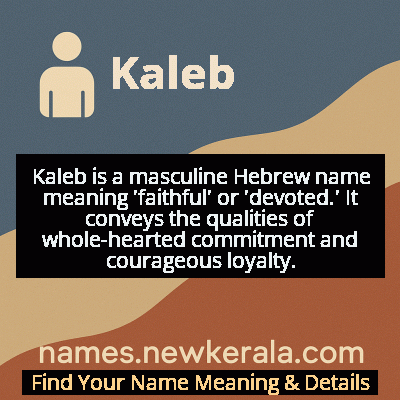Kaleb Name Meaning & Details
Origin, Popularity, Numerology Analysis & Name Meaning of Kaleb
Discover the origin, meaning, and cultural significance of the name KALEB. Delve into its historical roots and explore the lasting impact it has had on communities and traditions.
Name
Kaleb
Gender
Male
Origin
Hebrew
Lucky Number
4
Meaning of the Name - Kaleb
Kaleb is a masculine Hebrew name meaning 'faithful' or 'devoted.' It conveys the qualities of whole-hearted commitment and courageous loyalty.
Kaleb - Complete Numerology Analysis
Your Numerology Number
Based on Pythagorean Numerology System
Ruling Planet
Uranus (Rahu)
Positive Nature
Strong sense of order, loyal, practical, and disciplined.
Negative Traits
Stubborn, overly serious, rigid, and prone to feeling restricted.
Lucky Colours
Blue, gray.
Lucky Days
Saturday.
Lucky Stones
Blue sapphire.
Harmony Numbers
1, 7, 8.
Best Suited Professions
Managers, engineers, accountants, organizers.
What People Like About You
Dependability, discipline, practicality.
Famous People Named Kaleb
Caleb of the Bible
Biblical Figure
Faithful spy who inherited Hebron for his unwavering belief
Caleb Bradham
Pharmacist and Entrepreneur
Founded Pepsi-Cola and created the original formula
Caleb Landry Jones
Actor and Musician
Award-winning performer in film and music industries
Caleb McLaughlin
Actor
Starred in groundbreaking series 'Stranger Things'
Name Variations & International Equivalents
Click on blue names to explore their detailed meanings. Gray names with will be available soon.
Cultural & Historical Significance
Throughout Jewish and Christian traditions, Caleb has been celebrated as a model of faithfulness and perseverance. His story has inspired countless sermons, religious teachings, and artistic representations over centuries, establishing him as an enduring symbol of righteous courage and divine reward for steadfast belief. The name's association with these qualities has made it particularly meaningful in religious communities and among families valuing biblical heritage. In modern times, the name continues to carry these deep cultural resonances while adapting to contemporary naming practices through variations like the 'K' spelling.
Extended Personality Analysis
Individuals named Kaleb are often perceived as embodying the core qualities of their biblical namesake: boldness tempered with faithfulness. They typically exhibit strong leadership potential combined with a deeply principled character. Kaleb's are frequently described as courageous decision-makers who aren't afraid to stand alone in their convictions when necessary. Their boldness manifests not as recklessness but as calculated courage—the willingness to face challenges head-on while maintaining moral integrity. This combination often makes them natural leaders who inspire confidence in others.
The faithful aspect of the name translates to remarkable loyalty in personal relationships and professional commitments. Kaleb's tend to be dependable friends, devoted partners, and trustworthy colleagues who honor their word and maintain strong ethical standards. They often demonstrate resilience in adversity, drawing strength from their convictions and principles. While they can be determined and sometimes stubborn in pursuing their goals, this is typically balanced by a compassionate nature and genuine concern for others' wellbeing. Their whole-hearted approach to life means they engage deeply with their passions, relationships, and responsibilities, making them valued members of their communities and families.
Modern Usage & Popularity
Kaleb has maintained consistent popularity as a masculine given name in English-speaking countries, particularly in the United States where it has ranked within the top 100-200 boys' names for several decades. The 'K' spelling variation gained traction in the late 20th century as parents sought to give traditional biblical names a modern, distinctive twist. While the classic 'Caleb' spelling remains more common, 'Kaleb' appeals to families wanting to honor the name's heritage while providing a unique spelling. The name enjoys particular popularity among Christian communities who appreciate its strong biblical associations, and recent trends show it being used across diverse ethnic and cultural backgrounds while remaining most prevalent in American and English-speaking contexts. Its enduring appeal lies in balancing traditional roots with contemporary sound, making it both respectable and approachable for modern children growing up in the 21st century.
Symbolic & Spiritual Meanings
Symbolically, Kaleb represents the fusion of courage and devotion—the ability to face formidable challenges while remaining steadfast in one's beliefs and commitments. The name embodies the concept of 'whole-heartedness,' suggesting complete engagement with life's pursuits and relationships. It symbolizes the rare quality of maintaining optimism and faith in the face of overwhelming odds, much like the biblical Caleb who saw promise where others saw only obstacles. Metaphorically, Kaleb represents the bridge between vision and reality—the capacity to not only dream of better possibilities but to actively work toward them with unwavering determination. The name also carries connotations of inheritance and legacy, referencing Caleb's biblical reward of the Promised Land, thus symbolizing the fruits of persistent faithfulness and the realization of long-awaited promises through dedication and moral courage.

